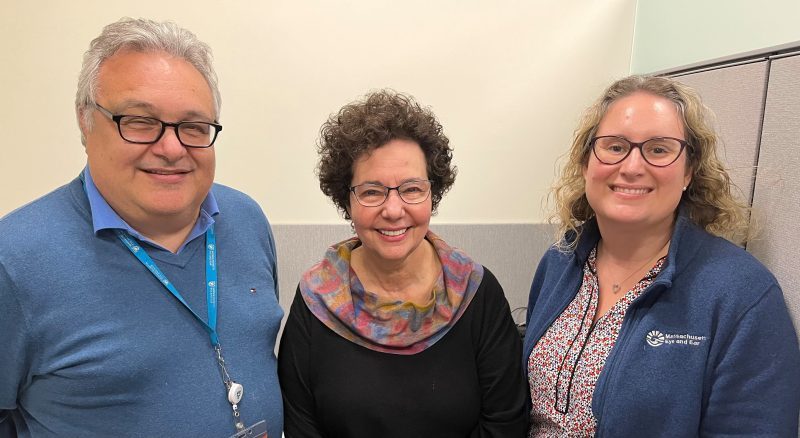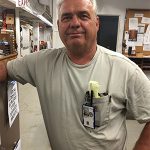In the face of physical illness, it’s crucial to also recognize mental health needs of patients. Mass Eye and Ear’s Social Work Department is committed to helping patients get through challenging times while connecting them with the resources needed to help them reacclimate to daily life.
Mass Eye and Ear’s Social Work Department is dedicated to providing patients and their families with psychosocial support and resources to help them manage the challenges of both acute and chronic illnesses in the hospital setting. While meeting with patients and families, social workers identify and address potential barriers to care and recovery with a compassionate approach.
Social workers have always focused on the “social determinants of health” such as housing, food insecurity, financial instability, employment, and education, all of which can significantly influence patients access to healthcare. In addition, social workers identify and address an individual’s risk factors which include the presence of mental health illness and substance abuse use disorders.
To learn more about this unique service, Focus spoke with Antonio Rossetti RN, Care Coordination Department Manager, Elissa Hatton, LICSW, Clinical Leader for Social Work assigned to the Head and Neck Inpatient Service and Sarah Olander, LICSW assigned to the Outpatient Ophthalmology Service and Emergency Room.
Supporting inpatient and outpatient services
Patients are referred to Mass Eye and Ear Social Work through a member of their care team, such as their physician, nurse, or physical therapist; however, they can also refer themselves by calling the department directly. Patients may be struggling with emotional and/or psychological challenges adjusting to illness and may need emotional support or access to resources to help with treatment. Some patients also have pre-existing mental health challenges that can make adjustment and managing illness even more difficult.
On the inpatient floor, Elissa mainly works with head and neck cancer patients who undergo extensive surgeries. Often the treatment involves temporary or permanent loss of function like eating and speaking. Sometimes surgeries result in facial changes or disfiguration. “The patient’s self-image and identity are affected and it is sometimes a long journey of adjustment,” said Elissa. “Likewise, there are almost always ripple effects of illness that cause additional stress like losing a job due to loss of function.”

Many of the head and neck cancer surgeries are not hidden. “Breast cancer surgery can be hidden by clothing. Here, our cancer removal surgeries affect the area of first impressions, the face,” said Antonio. These are dramatic changes for some of our patients, and their team’s goal is to help them adapt.
Elissa also works closely with patients who undergo the total laryngectomy surgery which is the removal of the voice box. These patients experience loss of their natural voice and face the challenge of learning how to speak again by other means, either through the use of an electrolarynx or through the placement of a valve called the TEP. Both require ongoing learning, practice and self-care alongside personal strength, resilience and support from others.
Prior to surgery, Elissa calls these patients at home to make a positive connection and thorough assessment; she meets families of the patient whenever possible. While in the hospital, Elissa provides supportive counseling and arranges for the new laryngectomy patient and their family to meet with a recovered laryngectomy patient volunteer over a Zoom meeting. “These visits are especially therapeutic helping the patient to see what their recovery will look like and to see the light at the end of the tunnel,” said Elissa.
All postoperative patients are invited by Elissa to join The Boston Laryngectomy Group, affiliated with Mass Eye and Ear, as part of their recovery process.
Sarah works in the outpatient clinics with patients who have vision loss, are legally blind or struggle with other eye conditions. She helps patients cope with loss of function and sensory changes and connects them with various services such as mobility training and other programs to help patients maintain as much independence as possible. “I work to help people find the services they need for a particular circumstance,” said Sarah. “It could be transportation, housing, income, or food resources.”
Some resources are available right at Mass Eye and Ear, such as the Vision Rehabilitation Department, which helps low vision patients learn how to use different devices to help them see and read better. Patients can also be referred to outside organizations like Visions of Independence and the Mass Association for the Blind, or if they qualify as legally blind, the Mass Commission for the Blind.
Sarah also works with patients who are in crisis, specifically in the Emergency Department. She provides crisis-intervention to patients struggling with mental health emergencies and helps connect them with mental health resources in the community. She also supports patients who are victims of domestic violence or dealing with other emergency situations, making necessary referrals when needed.
Meeting mental health needs
From eye care patients who struggle with chronic or debilitating illnesses to head and neck cancer patients going through life changing surgeries, there is almost always a period of adjustment that can include feelings of depression and anxiety.
Daily activities that once came naturally are now difficult to complete, leaving patients and their families in potential hardship. The social work team works with patients and their families providing short term supportive counseling and connecting them with appropriate resources in the community to help them navigate their recovery. Often this involves assessing mental health needs and helping them find mental health providers in the community.
If staff notice a significant change in a patient’s presentation, it could be an indicator that the patient is struggling emotionally or psychologically and a referral to social work would be indicated. The social work team works very hard to connect patients with support resources as quickly as possible.
The team also works closely with families to ensure they are aware of the signs of depression and encourages them to have open conversations with their family member who is healing.
“You can see a wound healing, but internally you won’t see a person healing,” said Antonio. “We hope families can recognize and help their loved ones open up and accept help.”
Utilizing this resource
The social work staff work with patients of all socioeconomic backgrounds. “Our team looks at the whole picture,” said Antonio. “Not just the surgery and the medical components but the social determinants of health and mental health.” The team ensures that all patients have equal access to resources, as the illnesses and surgeries often disrupt life as the patient previously knew it.
The Mass Eye and Ear Social Work Department is specific to the needs of patients who come to this specialized institution, and the department addresses the many effects that these illnesses have on the lives of our patients with specific attention to their mental health needs.
Learn more about Mass Eye and Ear’s Social Work Department and how it can be a resource to you or a loved one. To contact the department, call 617-573-3550.



